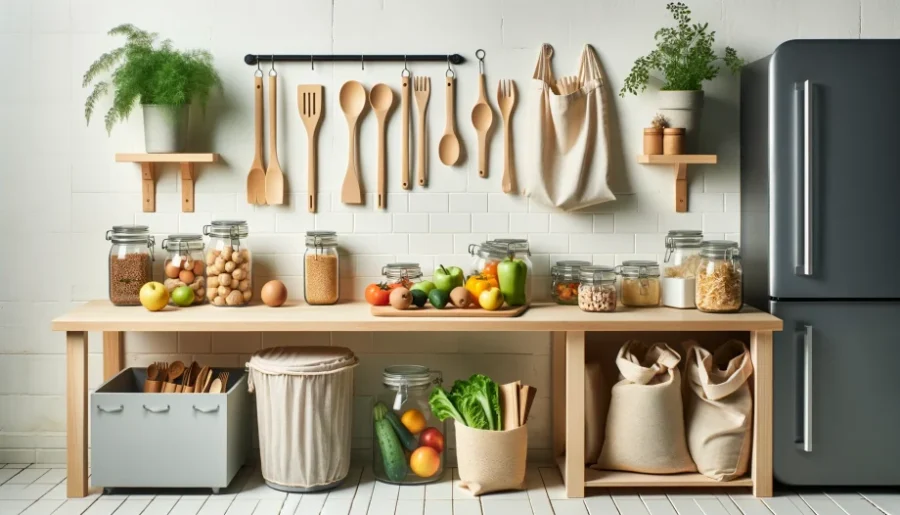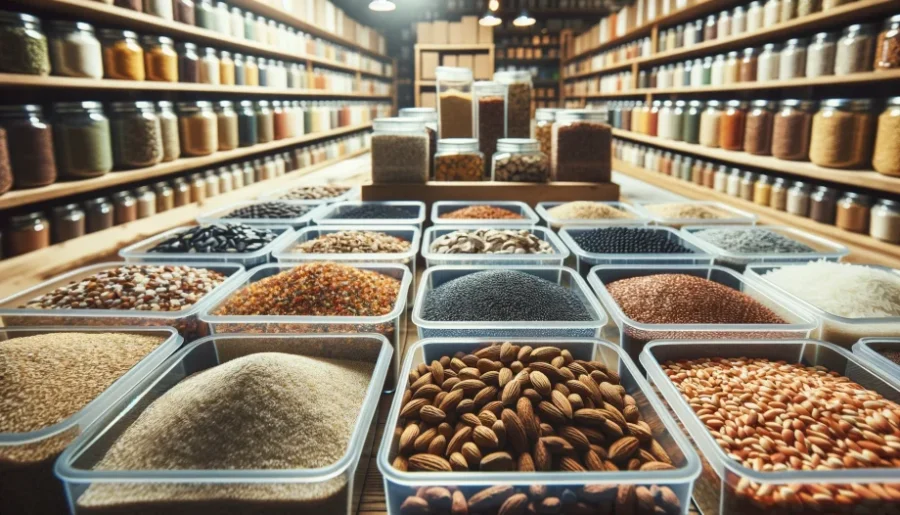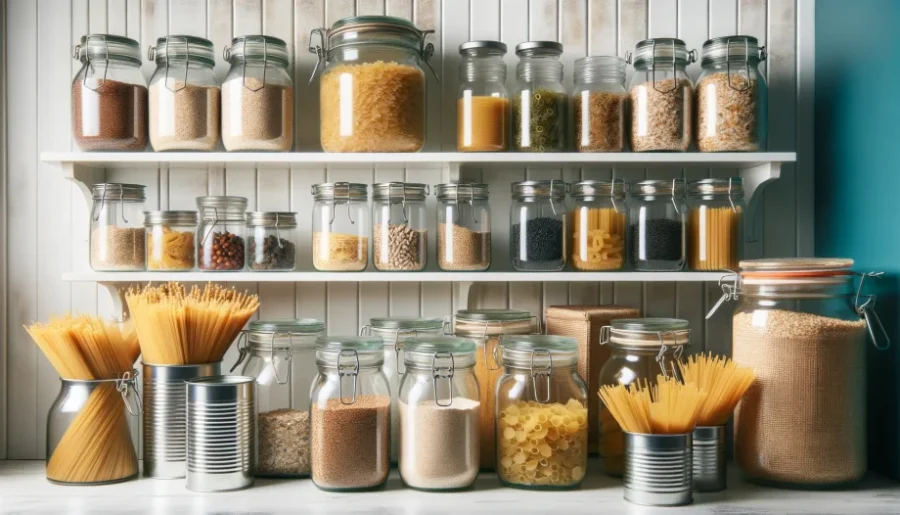
Discover the art of designing a zero-waste lifestyle with our practical guide. Embrace sustainability and make a positive impact on the planet!
Designing a Zero-Waste Lifestyle
Key Takeaways:
- Designing a Zero-Waste Lifestyle involves adopting sustainable practices like refusing unnecessary items, reducing consumption, reusing products, recycling responsibly, and composting organic waste.
- It’s a mindful approach to living that minimizes environmental impact.
Embarking on the journey of designing a zero-waste lifestyle is an exciting adventure!
It’s about transforming our daily habits to create a sustainable future.
Join us as we explore simple yet impactful ways to reduce waste and live in harmony with the environment.
Designing a Zero-Waste Lifestyle: A Step-by-Step Guide
Introduction: Embracing a Sustainable Future
In our journey towards a more sustainable future, designing a zero-waste lifestyle is a powerful step.
It’s about more than just reducing waste; it’s about creating a mindful and eco-friendly way of living.
By embracing the core principles of zero-waste, we can make significant strides in minimizing our environmental footprint.
Let’s delve into some key subtopics to better understand how we can adopt a zero-waste lifestyle.
The Importance of Mindful Consumption
Mindful consumption is at the heart of a zero-waste lifestyle.
It’s about being aware of the impact of our choices and opting for products that are sustainable and have a minimal environmental footprint.
This means choosing items with less packaging, buying in bulk, and supporting eco-friendly brands.
Creating Eco-Friendly Habits
Developing eco-friendly habits is crucial for maintaining a zero-waste lifestyle.
This includes simple actions like carrying reusable bags, using a water bottle, and avoiding single-use plastics.
Over time, these small changes can lead to a significant reduction in waste.
Community Involvement and Advocacy
A zero-waste lifestyle isn’t just a personal choice; it’s also about community involvement and advocacy.
By sharing our knowledge and encouraging others to adopt sustainable practices, we can create a ripple effect that leads to broader environmental change.
By focusing on these subtopics, we can gain a deeper understanding of how to effectively embrace a zero-waste lifestyle and contribute to a more sustainable future.
Understanding the Zero-Waste Principles
The foundation of a zero-waste lifestyle lies in five key principles: refuse, reduce, reuse, recycle, and rot.
These principles guide us in making sustainable choices and minimizing our impact on the environment.
Let’s delve deeper into each of these principles and understand their significance.
Refuse: Saying No to Unnecessary Items
The first step in adopting a zero-waste lifestyle is to refuse items that we don’t need.
This means saying no to single-use plastics, excessive packaging, and products that are not essential.
By refusing unnecessary items, we can prevent waste from entering our lives in the first place.
Reduce: Simplifying Our Lives
Reducing our consumption is another crucial aspect of zero-waste.
This involves simplifying our lives and only purchasing what we truly need.
By reducing the amount of stuff we buy, we can minimize our environmental footprint and live a more sustainable lifestyle.
Reuse: Finding New Life for Old Items
Reusing items is a great way to extend their lifespan and keep them out of landfills.
This can include repurposing glass jars, using cloth bags instead of plastic, and repairing items instead of discarding them.
Reusing not only reduces waste but also promotes a culture of resourcefulness.
Recycle: Transforming Waste into Resources
Recycling is an important part of the zero-waste journey, but it should be seen as a last resort after refusing, reducing, and reusing.
Proper recycling ensures that materials are processed and transformed into new products, reducing the need for raw materials and conserving natural resources.
Rot: Embracing Composting
Finally, rot refers to composting organic waste such as food scraps and yard waste.
Composting is a natural process that returns nutrients to the soil, enriches the earth, and reduces the need for chemical fertilizers.
It’s a key element in creating a sustainable, zero-waste lifestyle.
By understanding and applying these five principles, we can build a strong foundation for a zero-waste lifestyle that benefits both ourselves and the planet.
Read more about why zero-waste matters
Applying Zero-Waste Principles in Daily Life

Incorporating zero-waste principles into our daily routines requires a mindset shift.
By making conscious choices and adopting sustainable habits, we can significantly reduce our environmental impact.
Here are some practical tips to help you embrace a zero-waste lifestyle:
Grocery Shopping: Embracing Reusables
- Bring Your Own Bags: Always carry reusable bags, produce bags, and containers when grocery shopping. This helps refuse single-use plastic bags and reduces packaging waste.
- Bulk Buying: Purchase items in bulk using your own containers to minimize packaging waste. Look for stores with bulk bins for grains, nuts, and spices.
- Choose Package-Free Produce: Opt for fresh, package-free fruits and vegetables. This not only reduces waste but also supports healthy eating.
Meal Planning: Reducing Food Waste
- Plan Ahead: Plan your meals for the week to avoid buying more than you need. This helps reduce food waste and saves money.
- Use Leftovers: Get creative with leftovers to prevent food from going to waste. Leftover vegetables can be turned into soups, and stale bread can be used for croutons.
- Compost Scraps: Compost food scraps to create nutrient-rich soil for your garden. This closes the loop by returning organic matter back to the earth.
Home Organization: Simplifying and Decluttering
- Declutter Regularly: Periodically declutter your home to remove items you no longer need or use. This helps reduce clutter and makes it easier to maintain a zero-waste home.
- Donate or Sell: Instead of throwing away unwanted items, consider donating them to charity or selling them. This gives items a second life and keeps them out of landfills.
- Choose Durable Products: Invest in high-quality, durable products that will last longer. This reduces the need for frequent replacements and cuts down on waste.
Personal Care: Eco-Friendly Alternatives

- Switch to Sustainable Products: Replace disposable personal care items with eco-friendly alternatives, such as bamboo toothbrushes, metal razors, and cloth menstrual pads.
- Refillable Containers: Look for refillable options for shampoo, soap, and lotion. Many stores now offer refill stations for personal care products.
- DIY Skincare: Experiment with making your own skincare products using natural ingredients. This reduces packaging waste and allows you to control what goes on your skin.
By integrating these tips into your daily life, you can make a meaningful contribution to a more sustainable and zero-waste future.
FAQ Section: Navigating the zero-waste Lifestyle
Embarking on a zero-waste lifestyle is an exciting journey, but it’s natural to have questions along the way.
Here are some frequently asked questions and answers to help you navigate your zero-waste journey with confidence:
Q: What exactly does zero-waste mean?
A: zero-waste means striving to eliminate waste by reducing, reusing, recycling, and composting.
It’s not about completely eradicating all waste but making conscious choices to minimize waste and its environmental impact.
Q: Is zero-waste just about recycling?
A: While recycling is an essential part of the zero-waste movement, it’s not the only focus.
Zero-waste emphasizes refusing unnecessary items, reducing consumption, reusing as much as possible, and composting organic matter. Recycling is just one aspect of a holistic approach.
Q: Where should I start my zero-waste journey?
A: Start by examining your trash to identify your biggest areas of waste.
Set small goals to tackle each area. For example, if you notice a lot of kitchen waste, focus your efforts there.
A zero-waste lifestyle often begins in the kitchen.
Q: Is it hard to adopt a zero-waste lifestyle?
A: It requires effort, but it’s achievable with small steps. Start with one area of your life, like implementing a zero-waste kitchen, and then move on to the next. Baby steps make the transition easier.
Q: Does adopting a zero-waste lifestyle cost money?
A: While some initial investments may be needed for items like reusable straws or mesh bags, these purchases often save money in the long run by eliminating the need for disposable products.
Q: Does zero-waste mean giving up a normal life?
A: Embracing a zero-waste lifestyle doesn’t mean giving up normal life.
It’s about adjusting your approach and finding zero-waste alternatives for products you use.
There are options for almost any product, from cosmetics to clothing.
Q: What if I mess up?
A: No one is perfect, and the goal is progress, not perfection.
Join online forums for ideas and support, and remember that every small step towards reducing waste makes a difference.
Remember, the journey to zero-waste is a continuous learning process.
By asking questions and seeking solutions, you’re already making a positive impact on the environment and your lifestyle.
Conclusion: Building a Sustainable Lifestyle

Designing a zero-waste lifestyle is a journey of continuous improvement.
It’s about making conscious choices every day that align with our values of sustainability and respect for the environment.
By following these principles, we can create a lifestyle that not only reduces waste but also fosters a deeper connection with the world around us.
Let’s explore some final thoughts and encourage everyone to take the first step towards a zero-waste lifestyle.
Embrace the Journey, Not Just the Destination
Remember that adopting a zero-waste lifestyle is a journey, not a one-time destination.
It’s about progress, not perfection. Celebrate the small victories along the way and be kind to yourself when things don’t go as planned.
Every effort counts, and each step you take is a step towards a more sustainable future.
The Power of Community
You’re not alone in this journey. Connect with others who share your passion for sustainability.
Join online forums, local groups, or social media communities to exchange ideas, share successes, and support each other.
Together, we can create a larger impact and inspire more people to join the zero-waste movement.
Continued Learning and Growth
Sustainability is an evolving field, and there’s always something new to learn.
Stay curious and open to new ideas. Attend workshops, read books, and keep up with the latest trends in zero-waste and sustainability.
Education is a powerful tool that empowers us to make informed decisions and become advocates for change.
Take Action and Inspire Others
Lead by example and inspire those around you. Share your journey, the challenges you’ve faced, and the solutions you’ve found.
By demonstrating the positive impact of a zero-waste lifestyle, you can motivate others to consider their own habits and the changes they can make for a better planet.
Final Thoughts
As we conclude this journey into designing a zero-waste lifestyle, remember that every action counts.
Whether it’s refusing a single-use plastic bag, composting food scraps, or advocating for sustainable policies, your choices make a difference.
Let’s continue to strive for a world where sustainability is the norm, and together, we can build a healthier, more sustainable future for generations to come.
Read and learn more: Mastering Zero-Waste Living: 7 Easy Tips and Tricks
Resources for Embracing a Zero-Waste Lifestyle
Adopting a zero-waste lifestyle can be a rewarding journey toward sustainability and environmental responsibility.
To assist you in this endeavor, here are some authoritative resources that provide valuable information, guidance, and inspiration:
Websites
- World Economic Forum – zero-waste Guide: The World Economic Forum offers a comprehensive guide to zero-waste, emphasizing the importance of reuse and providing practical tips for everyday living. Visit website
- U.S. Environmental Protection Agency (EPA) – zero-waste: The EPA provides a detailed explanation of zero-waste principles and practices, highlighting the role of communities and government agencies in achieving zero-waste goals. Visit website
Government Initiatives
- City of San Francisco – zero-waste Program: San Francisco’s zero-waste Program aims to send zero discards to the landfill, focusing on waste prevention, reduction, reuse, recycling, and composting. Learn more
- City of Los Angeles – zero-waste LA: Los Angeles is working towards a goal of zero-waste to landfill by 2025, emphasizing product creation, use, and disposal changes. Learn more
- City of Austin – zero-waste Strategic Plan: Austin has set a goal to divert 90% of waste from landfills and incinerators by 2040, focusing on a whole system approach to waste management. Learn more
Books
- zero-waste Home by Bea Johnson: A comprehensive guide to reducing waste in every aspect of your life, filled with practical tips and personal insights. Available on Amazon

- The zero-waste Lifestyle by Amy Korst: A practical guide to living waste-free, offering step-by-step advice on reducing your environmental footprint. Available on Amazon

- 101 Ways to Go zero-waste by Kathryn Kellogg: A light-hearted and accessible introduction to zero-waste living, with easy tips for everyday life. Available on Amazon

By exploring these resources, you can gain a deeper understanding of zero-waste principles, find practical solutions for reducing waste, and connect with initiatives that support a sustainable lifestyle.
Remember, every step towards zero-waste is a step towards a healthier planet and a more sustainable future.









